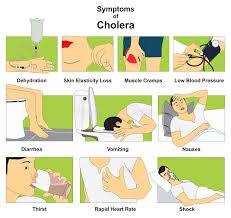Cholera is a waterborne bacterial infection caused by the bacterium Vibrio cholerae. Here are 10 causes, 10 effects, and some solutions related to cholera:
**Causes:**
1. Contaminated Water: Cholera is primarily spread through the consumption of contaminated water sources.
2. Poor Sanitation: Lack of proper sanitation facilities can lead to the contamination of water supplies.
3. Overcrowding: High population density can facilitate the rapid spread of the disease.
4. Malnutrition: Malnourished individuals are more susceptible to cholera.
5. Climate Conditions: Cholera outbreaks are more common in areas with warm, rainy climates.
6. Lack of Hygiene: Poor personal hygiene practices can contribute to the spread of cholera.
7. Fecal-Oral Transmission: Handling contaminated materials and not washing hands properly can lead to transmission.
8. Travel and Trade: Movement of infected individuals can spread the disease to new regions.
9. Inadequate Healthcare: Limited access to medical care can result in delayed treatment.
10. Lack of Education: A lack of awareness about cholera prevention can exacerbate the problem.
**Effects:**
1. Severe Diarrhea: Cholera causes profuse, watery diarrhea, leading to dehydration.
2. Dehydration: Rapid fluid loss can result in severe dehydration and electrolyte imbalances.
3. Electrolyte Imbalance: Dehydration can lead to imbalances in potassium and sodium levels.
4. Muscle Cramps: Electrolyte imbalances can cause painful muscle cramps.
5. Shock: Severe dehydration can lead to hypovolemic shock, a life-threatening condition.
6. Kidney Failure: Prolonged dehydration can damage the kidneys.
7. Death: Without prompt treatment, cholera can be fatal, especially in vulnerable populations.
8. Economic Impact: Cholera outbreaks can strain healthcare systems and disrupt economies.
9. Social Disruption: Fear of cholera can lead to social stigma and community unrest.
10. Long-Term Health Effects: Survivors may suffer from long-term health issues due to the disease's severity.
**Solutions:**
1. Clean Water: Ensure access to clean, safe drinking water through purification and treatment.
2. Sanitation: Improve sanitation infrastructure and promote proper waste disposal.
3. Hygiene Education: Educate communities about handwashing and personal hygiene.
4. Vaccination: Implement cholera vaccination campaigns in high-risk areas.
5. Rapid Response: Establish surveillance systems and rapid response teams for outbreaks.
6. Oral Rehydration Therapy: Provide timely rehydration treatment to affected individuals.
7. Antibiotics: Use antibiotics to treat severe cases and limit the spread of the bacteria.
8. Community Engagement: Involve communities in prevention and response efforts.
9. Climate Resilience: Build climate-resilient infrastructure to withstand environmental changes.
10. Health Systems Strengthening: Improve healthcare access and facilities to provide timely treatment.
Combating cholera requires a multi-pronged approach that addresses both the immediate medical needs of affected individuals and the long-term prevention strategies to reduce the disease's prevalence.



No comments yet
Be the first to share your thoughts!